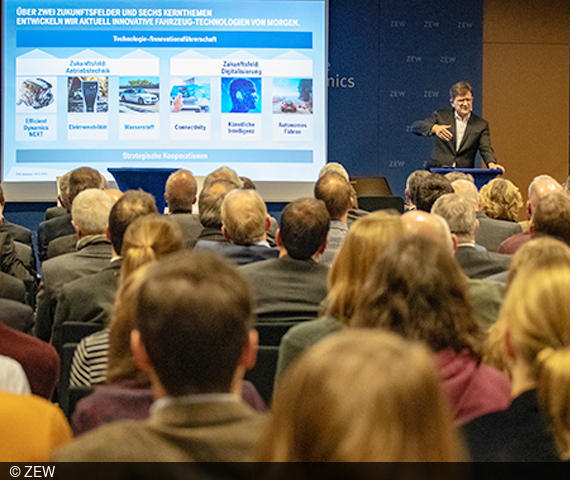How to Put E-Mobility on the Roads
Public EventsElectromobility, safety, autonomous driving and artificial intelligence (AI) – these are the major topics of the automotive industry according to Klaus Fröhlich, board member for development of the Bavarian automobile manufacturer BMW. With market conditions becoming ever more dynamic, it is difficult for a German carmaker to keep pace with China and the USA, let alone to define new standards. In his talk at the Centre for European Economic Research (ZEW), Mannheim, on 4 December 2018, Fröhlich presented his vision for the future of cars, the industry as a whole as well as his own company in the lecture series “First-Hand Information on Economic Policy”.
“We need to adopt a proactive approach to change in order to keep up with technological developments,” Klaus Fröhlich opened his lecture to around 155 guests from the worlds of business, science and politics. This is essential in view of the dynamic changes taking place both globally and in the core business of the industry. According to Fröhlich, these changes have included a significant blow to the image of the German automotive industry, a more critical attitude towards diesel technology and a tightening of regulatory measures – the latter of which applies above all to Europe. “As a globally active company, BMW also faces the challenge of an increasing regionalisation of needs and requirements that are hampered by trade barriers,” explained Fröhlich. With China being BMW’s largest premium market worldwide, and Great Britain the fourth largest sales market, setting up additional international trade barriers and reducing the trade volume would have a massive impact on BMW.
As a response to the changed framework conditions, Fröhlich demanded to “act dynamically.” The car is about to become the third living space besides the house and workplace. Fröhlich went on to explain that since people are spending more time in their cars, they expect them to be equipped with more features, particularly in the area of consumer electronics, making cross-industry partnerships all the more important.
For Fröhlich, sustainable drive technologies and the digitisation of vehicles clearly lead the path to an innovative future. “The electrification of vehicles marks a massive change in the automotive industry, which will separate the wheat from the chaff. It is up to us to push different drive technologies at the same time,” said Fröhlich. Since developments in autonomous driving, connectedness and artificial intelligence are five to ten times faster than in other areas, digitalisation is all the more important – and the automotive industry has a lot of catching up to do in this regard.
Electromobility is the “new normal”
For the BMW board member, electromobility – alongside sustainable combustion engines with low CO2 emissions – is leading the way in future driving technologies. BMW is now developing the fifth generation of electric drives, while having also built up enormous know-how in the field of battery cells. Nevertheless, Europe does not yet display any visible trend towards electromobility, and particularly in Germany consumers continue to be reluctant to buy electric cars. According to Fröhlich, it is much easier to introduce and sell electric technologies in China and the US. This is corroborated by forecasts predicting that “China will lead the way” in this regard, with an increasing number of Chinese start-ups trying to expand into the global market. Nevertheless, BMW is also recording a rise in registrations of electric cars. While BMW has sold 140,000 this year, the car manufacturer aims to have sold 500,000 electric cars by 2019.
“It is not difficult to build an electric vehicle. It is more complicated to develop a sustainable, high-margin business model,” explained the BMW board member, focussing on incurred costs. “Because of the integrated battery, electric cars will always be more expensive than vehicles with a combustion engine. We have to produce a car for which customers do not have to pay an exorbitant price,” stressed Fröhlich. This is further aggravated by existing concerns and residual risks regarding electromobility. To counter these problems, Fröhlich plans to “emotionalise and regionalise” the added customer value in the future, as well as to safeguard important raw materials such as lithium and cobalt. “In order to become less dependent on these raw materials we have developed further our designs, including an electric motor that no longer requires rare earths,” Fröhlich pointed out. A technical penetration of the complete business processes is thereby necessary to achieve cost leadership. Fröhlich explained that BMW is focusing on end-to-end value creation, i.e. understanding the value chain from start to finish.
Self-driving cars to become roadworthy by 2021
From Fröhlich’s perspective, the race for gaining technological leadership in autonomous driving is currently entering a critical phase, with BMW being right in the middle of this megatrend. BMW plans to develop a motorway pilot until 2021, which promises to be at an unprecedented technological level thanks to AI. AI technology is vital for the development of self-driving vehicles, as they have to be able to both adopt human sensory capabilities and make autonomous decisions. Endowing these vehicles with a detailed map is simply not enough. “Human drivers are able to anticipate what might happen next. Neural networks still have to acquire this knowledge to mimic complex human actions,” said Fröhlich.
“The coming years will be characterised by massive technological leaps that must be used to set global automotive standards for the generations to come,” stressed Fröhlich. In an appeal directed primarily at German policymakers, he also stressed the importance of an adequate regulatory framework and infrastructure.
According to Fröhlich, as soon as driverless vehicles are roadworthy, they will significantly reduce both the traffic volume and number of accidents. At present, 80 per cent of car accidents are caused by human error, which could be avoided thanks to AI. Annoying car journeys such as the daily commute or long-distance travels could also become more pleasant in fully automated vehicles.

